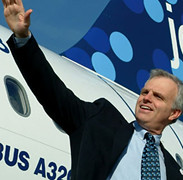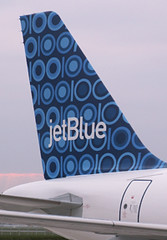Zagat Survey today announced the results of the 2007 Zagat Global Airlines Survey. Singapore Airlines took top honors as the best international economy class and Midwest Airlines pulled the No. 1 spot for domestic economy class again. Midwest Airlines has taken top honors in the past eight Zagat surveys; Virgin America and JetBlue Airways followed as No. 2 and 3.
While social media proponents might consider crowing that the number one and number two domestic Web sites both support well-planned blogs, the real communication lesson for the airlines comes from Zagat participant comments that pinpoint the state of the industry. Here are a few favorites:
“I’d rather be a package on FedEx.”
“The legroom is great if you’re a yard gnome.”
“Their planes make Larry King look young.”
“I thought the Geneva Convention prevented this kind of thing.”
“Only good thing about first class these days is that you get to leave the plane first.”
Ouch!
JetBlue continues to score big with its fans despite the “nightmare delays” last winter. But all is not bliss as public relations professionals like to claim. JetBlue continues to balance leather seats, satellite TV, and happy crews, and decent snacks against rising prices, limited routes, and points that expire.
Still, third is a long way from the bottom, an honor that belongs to U.S. Airways, which came in last among domestic airlines. (And Philadelphia International came in fourth from the bottom among airports.) Hmmm … I wonder why.
The survey covered 7,498 frequent fliers who rated 84 airlines and 46 major airports. Each airline was separately rated on its premium and economy service for both domestic and international flights. The typical survey participant took 19.7 flights in the past year aggregating 147,000 trips. For complete results from domestic and international carriers, visit Zagat.

While social media proponents might consider crowing that the number one and number two domestic Web sites both support well-planned blogs, the real communication lesson for the airlines comes from Zagat participant comments that pinpoint the state of the industry. Here are a few favorites:
“I’d rather be a package on FedEx.”
“The legroom is great if you’re a yard gnome.”
“Their planes make Larry King look young.”
“I thought the Geneva Convention prevented this kind of thing.”
“Only good thing about first class these days is that you get to leave the plane first.”
Ouch!
JetBlue continues to score big with its fans despite the “nightmare delays” last winter. But all is not bliss as public relations professionals like to claim. JetBlue continues to balance leather seats, satellite TV, and happy crews, and decent snacks against rising prices, limited routes, and points that expire.
Still, third is a long way from the bottom, an honor that belongs to U.S. Airways, which came in last among domestic airlines. (And Philadelphia International came in fourth from the bottom among airports.) Hmmm … I wonder why.
The survey covered 7,498 frequent fliers who rated 84 airlines and 46 major airports. Each airline was separately rated on its premium and economy service for both domestic and international flights. The typical survey participant took 19.7 flights in the past year aggregating 147,000 trips. For complete results from domestic and international carriers, visit Zagat.



















